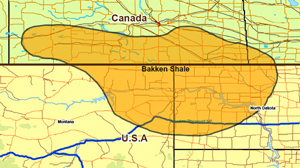The AP's Matt Brown has a piece that covers an issue that anyone who spends time in eastern Montana already knows about: there is a dark side to the Bakken oil boom. The specific problems that Brown addresses are criminal, but housing shortages, labor shortages for essential services, and rising costs of living also are well-known items on the list.
In MH's opinion, many of these problems are unavoidable -- when there is any kind of wide-open "rush," there will be camp followers who bring their problems with them, and there will be growth pains. From our observations, Montana has tended to avert its eyes from the Bakken, hoping that it will just sort of take care of itself. If we don't encourage it, we may miss out on the big bucks, but we'll also miss out on the big problems, right?
Well, not really. The oil is going to get drilled on the ND side of the border because that state has a plan to exploit the boom to the fullest. The business and the government revenue will stick disproportionately to the ND side of the border, while the problems will not recognize the existence of a border, and will spill over according to natural forces of supply and demand.
So we thus begin to see the price of Montana's failure to rise to the challenge of making the most of our share of the Bakken: instead of paying attention to our laws -- tax, unemployment insurance, worker's comp, regulatory -- to encourage businesses to base out of Montana, our inattention has led to a failure to maximize the economic impact of oil development. As a result, Montana doesn't have the funding to deal with the problems that we were always going to face, no matter what.
We will get our share of crime and man-camps and beat-up roads, but not our share of the permanent economic development.
Consider: Glendive is in the heart of Montana oil-producing country. It also marks the half-way point between Billings and Minot, ND. Let's say that you are in some sort of oil-field support business and are looking for a place out of which to base your burgeoning oil-related corporation. You know that ND has a more favorable business climate, so you headquarter in Minot.
But what if ND did not have a more favorable business climate? What if things were the same in Billings and Minot? Which would you choose -- the one with ski-slopes and fly-fishing streams ready to hand, the one with a well-established and diverse base of restaurants and shopping, the one with a warm micro-climate that keeps you in a winter banana-belt? Or would you choose the frozen north where Souris River flooding is what passes for summer entertainment, between mosquito dodging and other outdoor sports?
This is, we hasten to say, hyperbole! The serious point is that there are many structural attractions to basing a corporation out of Billings when compared to basing it out of someplace in North Dakota. Why Montana's leaders aren't out trying to figure out how to make this sale is a mystery. We are going to get the problems. Why are we not trying to get the economic growth? It may be too late, and Montana may be falling prey to something that once upon a time was the sole possession of North Dakota vis a vis non-agricultural economic growth -- helplessness, pessimism, and despair.
It doesn't have to be that way. Given a choice, would we at MH -- old fashioned agrarians that we are -- choose to not have any of this oil stuff at all? On our more curmudgeonly "leave us alone -- we liked things the way they were" days, well, absolutely. But conservatives are, if anything, realists. The Bakken isn't going away. A state without the capacity to change is without the means of its conservation, to paraphrase Russell Kirk, as oft is our wont.

No comments:
Post a Comment